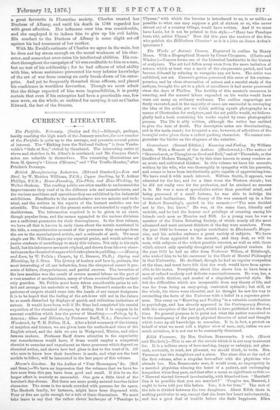Gravenhurst. (Second Edition.) Knowing and Feeling. By William Smith. With
a Memoir of the Author. (Blackwood.)—The author of " Gravenhurat, or Thoughts on Good and Evil," and of "Thorndale, or the Conflict of Modern Thought," is by this time known to many readers as an acute and cultivated thinker. In this volume we have his memoir, written by his wife, who was thoroughly in sympathy with his pursuits, and seems to have been intellectually quite capable of appreciating him. We have read it with much interest. William Smith, it appears, was educated for the bar, and for a time wont the Western circuit ; but he did not really care for the profession, and he attained no success in it. He was a man of speculative rather than practical mind, and being possessed of a small fortune, he was able to indulge his tastes and inclinations. His theory of life was summed up in a line of Robert Browning's, quoted in the memoir :—"Tho man decided not to live, but know." He was, at the same time, friendly and sociable, and he bad the honour and privilege of counting among his friends such mon as Maurice and Mill. As a young man he was a member of the Union Debating Society, of which nearly all the most advanced and moat eminent thinkers of the day were members. From the year 1839 be became a regular contributor to Blackwood's Maga- zine, and his articles embrace a groat variety of subjects. We have a list of them appended to the memoir, and they deal, as will be soon, with subjects of the widest possible interest, as well as with those which attract only specially thoughtful and philosophical readers. In the year 1851 he had an offer from Professor Wilson, of Edinburgh, who wished him to be his successor in the Chair of Mental Philosophy in that University. He declined, though he had no regular occupation at the time, and must have felt that the work would have been agree- able to his tastes. Everything about him shows him to have been a man of refined modesty and delicate conscientiousness.. Ho was, too, a really subtle thinker, and master of a singularly graceful style. He felt the difficulties which are inseparable from any theory of life, and was far from being an easy-going, contented optimist ; but still, on the whole, his views were cheerful, and he thought he saw his way to reconciling the facts of the Universe with a belief in n supreme good- ness. The essay on "Knowing and Fooling "is a valuable contribution to psychology, and has already appeared in the Contemporary Review, with the exception of the last part, which is bore published for the first time. Its general purpose is to point out what the author conceived to be the inadequacy of the purely physical theories of mind and thought which trace up all knowledge to sensation. It is, in fact, a protest on behalf of what we must call a higher view of man, and, unless we are much mistaken, it is not one to be summarily dismissed.


































 Previous page
Previous page